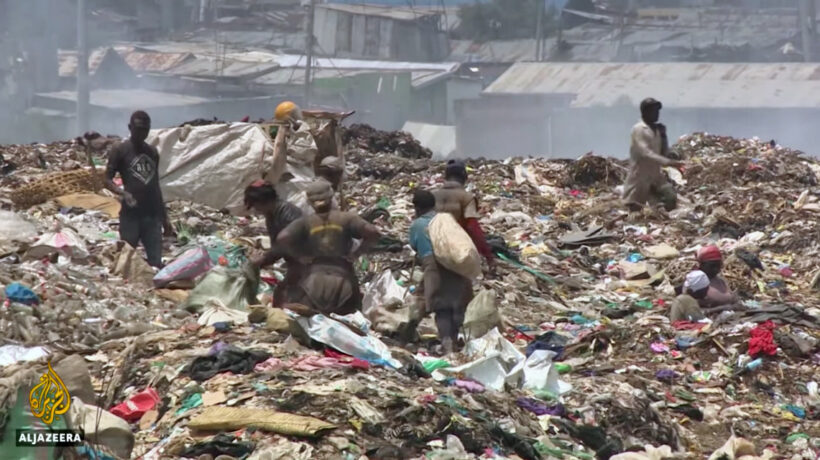Collecting plastics at a Nairobi rubbish dump (Image by Aljazeera, video capture)
Experts agree that Africa’s economies need to develop innovative approaches to deal with plastic production, which will double in 20 years and negatively affect the continent’s rural communities.
By Aimable Twahirwa
Experts agree that Africa’s economies need to develop innovative approaches to deal with plastic production, which will double in 20 years and negatively affect the continent’s rural communities.
The experts met in the Rwandan capital Kigali on the sidelines of the World Circular Economy Forum (WCEF), which ran from 6-8 December.
As a result of ongoing global efforts to drive Africa’s transition to a circular economy at national, regional and continental levels, official estimates show that the transition to a fully circular economy could generate $4.5 trillion in global economic benefits by 2030.
During the Global Forum, government representatives, researchers, civil society activists and strategic partners launched an initiative: the Big Ambition Coalition to End Plastic Pollution, with the goal of achieving this by 2040.
“The problem of plastic pollution has reached crisis levels and it is time to hold polluters accountable,” Zaynab Sadan, regional plastics policy coordinator for Africa at the non-governmental World Wildlife Fund (WWF), told IPS.
According to experts, the key to a circular economy in Africa is to eliminate open dumping and burning of waste on the continent and to promote the use of waste as a resource for value and job creation.
The circular economy aims to move from the current wasteful “take-make-dispose” model to “produce-consume-reuse”, in a virtuous circle that includes plastics in particular.
The latest estimates from the United Nations Environment Programme (UNEP) show that approximately 7 billion of the 9.2 billion tonnes of plastic produced between 1950 and 2017 worldwide have become plastic waste, ending up in landfills or thrown in the trash.
Environmental experts argue that this pollution has altered habitats and natural processes and reduced the ability of ecosystems to adapt to climate change, affecting the livelihoods, food production capacity and social well-being of millions of people, mainly in sub-Saharan Africa.
Experts unanimously agree that plastic consumption and production have reached unsustainable levels over the last 30 years, reaching 460 million tonnes between 2000 and 2019.
The Organisation for Economic Co-operation and Development’s (OECD) Global Plastics Outlook 2022 report indicates that much of this growth is mainly due to the massive increase in the production of single-use plastics for packaging and consumer goods. They account for half of all plastic waste generation.
To cope with this growing phenomenon, Sadan stresses the need for African countries to integrate informal sector workers into recycling and waste management.
“There is a pressing need to improve waste collection services and landfill management,” the conservation activist told delegates at the launch of the new Big Ambition Coalition to End Plastic Pollution.
Official projections indicate that by 2060, plastic use could nearly triple worldwide, driven by economic and population growth.
Plastic leakage into the environment is expected to double to 44 million tonnes per year, while the accumulation of plastics in aquatic environments will more than triple, with the greatest costs expected in sub-Saharan Africa, whose gross domestic product (GDP) would fall 2.8% below the baseline level.
Kristin Hughes, director of the Resource Circularity Pillar and a member of the World Economic Forum’s executive committee, told delegates that if current trends continue, by 2050 there will be one billion metric tons of plastic waste in landfills or in the natural environment.
“Mainstreaming science and an evidence-based approach are key to ending plastic pollution in Africa,” Hughes said.
During several sessions on the sidelines of the forum, Rwanda has been highlighted as a role model in Africa in waste management, because since banning plastic bags in 2008, it has moved forward with innovative measures and in 2018 installed e-waste recycling.
Regarding this progress, Rwandan Environment Minister Jeanne d’Arc Mujawamariya stressed the need for the country to strengthen existing mechanisms to have a carbon neutral economy by 2050.
“Despite these achievements, there are still shortcomings that expose the country to the serious consequences of inadequate waste management, including hazardous waste,” she said.
Terhi Lehtonen, Finnish deputy minister of environment and climate change, is convinced that eradicating plastic pollution requires a systemic approach, as plastic pollution is not simply a consumer problem.
“Plastic pollution is increasing at an alarming rate… African countries need to adopt a holistic control strategy at both the production and consumption levels,” he told delegates at the Forum.
The newly created global mechanism, the High Ambition Coalition to End Plastic Pollution, is committed to developing ambitious international and legally binding instruments based on a comprehensive and circular approach that ensures urgent action and effective interventions throughout the entire life cycle of plastics.
Erlend Haugen, Norwegian coordinator of the Global Initiative, said the new treaty should establish provisions for the minimisation of plastic waste and the environmentally sound collection, sorting and preparation for reuse and recycling of plastic waste, in order to reintroduce recycled plastics into the economy and prevent leakage into the environment.
But campaigners are convinced that communities also have vital knowledge and experience that can help combat the scourge of plastic pollution.
“Countries should also take a gender-sensitive approach to tackling plastic pollution,” said Sadan.
According to the activist, young people could also play a very influential role in controlling plastic waste by raising awareness of its negative impact.






